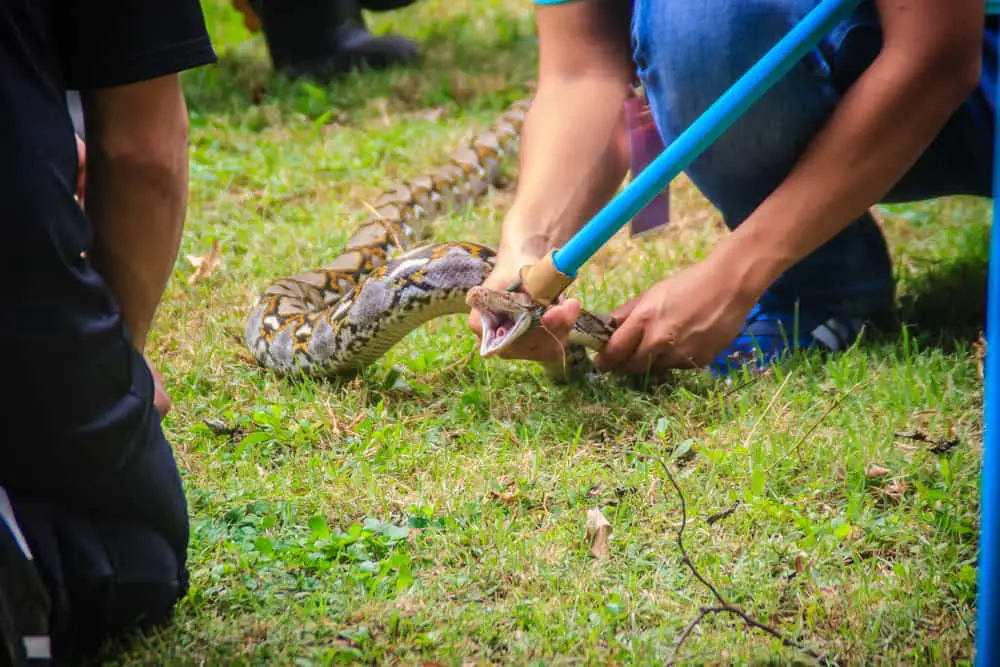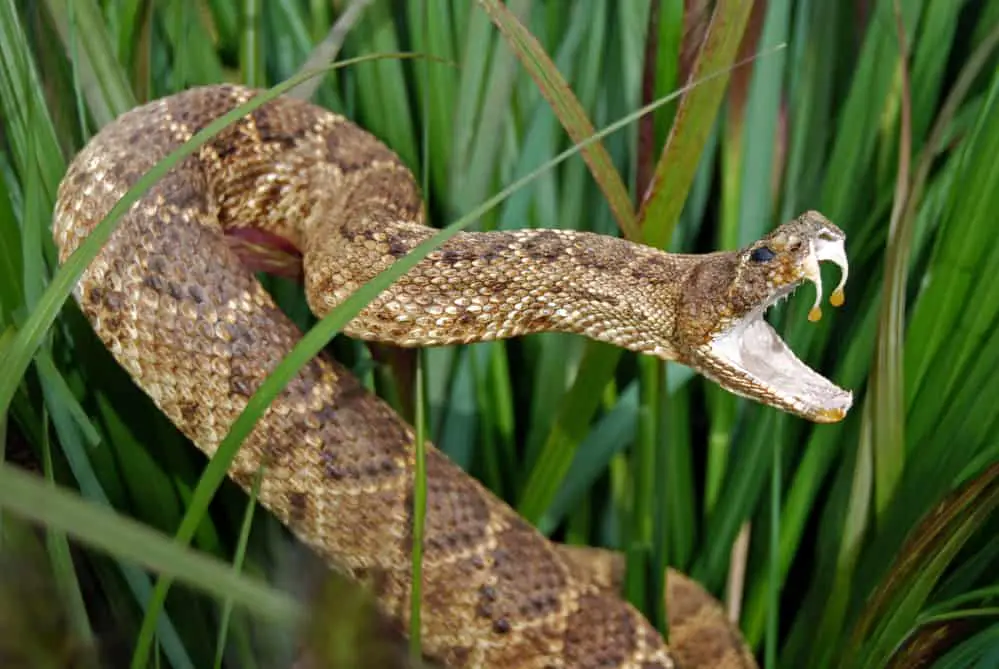Few household chemicals are as toxic and lethal as wasp spray. Wasps are nasty, territorial insects that will attack you viciously if you provoke them.
That means when attacking a wasp nest in your yard, you need your spray to never miss and to always kill on contact.
Quick Answer:
While wasp spray may harm a snake due to its chemicals, it’s not an effective, humane, or potentially legal method for dealing with snakes. Always handle wildlife responsibly. If a snake poses a threat or nuisance, contact a local wildlife removal service or animal control agency.
Insecticides like Raid are not just harmful to wasps and hornets; they can also affect aquatic animals and reptiles like snakes. Exposure to hornet spray can harm snakes but is it really the best solution to control them, and will enough insecticide actually kill a snake in your yard?
What Happens When You Spray a Snake with Wasp Spray?
Depending on how much wasp spray was sprayed, the concentration of the active ingredients to other chemicals, and where on the head or body of the snake was hit, several things can happen. If the snake bolts after the first spray, it is likely to become ill but may live if fresh water is present. If the snake’s entire body is sprayed and shot to the head, the snake will likely die.
The main problem with wasp spray is that it will not kill a snake instantly as it does a wasp. The active ingredients and toxic chemicals, pyrethroids like tetramethrin or pyrethrin, in wasp spray, cause damage to a snake’s nervous system. As it loses control of all bodily functions and absorbs more toxins, the snake will die a painful death.
A small amount of bug spray can kill a baby snake, whereas it will take a lot of chemical wasp spray to kill a larger snake. Because a little bit of spray can damage by blocking sodium channels, ensure pet snakes are not exposed to residue when spraying around open windows.
Insecticides are not meant to be a snake repellent or work as a spray for snakes, so it is not the ideal method for removing unwanted reptiles from your property, but they can be a lifesaver if you need to eliminate dangerous snakes in your yard or house.
How Fast Does Insecticide Kill Snakes?
If the entire body of a snake is covered in wasp spray, then it will likely die in 45 minutes to an hour. If no direct contact was made to the face and mouth, a snake may live for a few hours in constant pain. Small amounts of insecticide may not kill a snake and can lead to other issues.
If you need to maximize the effectiveness of wasp spray when killing snakes, follow these steps:
- Make sure you have a full can of wasp spray. It may take all of the spray to coat the snake and cover its body in the toxic active ingredients. Shake the can and judge by the empty space how full it is.
- Get safety gear to make sure you don’t accidentally ingest poison. Goggles for eye protection and a mask or bandana to protect your airways are smart. Gloves, long sleeves, long pants, and boots can protect your skin from blow-back and a snake attack.
- Approach the snake carefully and ensure it has a place to escape. Snakes are unlikely to bite and charge you unless they are cornered. If you allow an escape route, the snake may flee before you even need to spray. But if you do spray, the snake will flee from you and not typically charge you if you have allowed a way out.
- Spray with the wind and not against it to prevent chemicals from spraying into your face and leading to temporary blindness. Try to spray when there is less wind to prevent ecological casualties in your yard and garden.
- Spray the snake’s head, face, and mouth to inflict the most damage and kill it as quickly as possible. Cover the entire body to insure full absorption of the toxic active ingredients and to control the snake’s retreat.
- Keep the area where you sprayed free from pets and children for at least 48 hours after spraying the snake. The residual chemicals can cause sickness and irritation until that timeframe has elapsed.
Can Snakes Have a Tolerance to Wasp Spray?
Snakes can have a tolerance to insecticides. Wasp spray is not chemically much different from other insecticides used expansively in agriculture and many other commercial industries. The difference is the concentration of pyrethroids like tetramethrin or pyrethrin is much greater in Raid.
Wasp spray has a high concentration that would be illegal to apply broadscale. But by slowly absorbing these chemicals in the grass and fields where they live, snakes can develop a tolerance to wasp spray.
If you use wasp spray in your yard and it builds but in the grass and thickets, snakes will gain a defense against insecticides. This is why it is not recommended as a method of control and should only be used in emergency situations.
When to Use Wasp Spray on a Snake?
In most cases, contacting a pest control expert is way better than trying to kill a snake yourself. Sometimes a snake’s hiding space will be where you need to get something right now, and you have no other removal method. Other times it may be deadly types of snakes you need to destroy fast.
Non-venomous snakes like black snakes and garter snakes can usually be disturbed from hiding spots in yard debris with noise and as the sun heats up the earth. Once the non-venomous snake is scared away, a natural snake repellent can keep them out of that spot for good.
In North America, venomous snakes with triangular heads, such as wolf snakes, brown tree snakes, and copperhead snakes, can bite quite badly and cause real harm, even death. In some cases, a wasp killer can be an effective solution to stop these snakes from attacking.
Remember that only adults should use wasp spray or attempt to kill or remove a snake. Although toxic to all humans, insecticide and venomous snakes will cause much more harm to a young child than an adult. Make sure to check the areas where your children play for snakes regularly. If children are exposed to wasp spray, seek medical treatment right away.
How to Safely Deal with Snakes?

There are so many ways to safely deal with snakes that injuring or killing them should be the last course of action. Depending on the type of snake and where you find them, there are several ways to safely avoid snake issues.
| Location | How To Remove | How To Prevent |
| Garden or yard | Wait for the sun to heat up and then make a lot of noise | Grow natural snake repellents and reduce pests that attract snakes |
| Shed or outdoor structure | Find entrance points and seal while the snake is out hunting | Make sure all outside buildings are properly sealed and pest free |
| Garage, attic, or indoors | Call a pest removal professional | Seal all spaces large enough for snakes to enter |
Garden or Yard – If snakes are in your yard or garden, chances are they are hunting, sunning, or just passing through. If you make enough noise, the snake will usually move along on its own. Once a snake has left, you can plant natural snake-repellent plants like marigolds, garlic, lemongrass, wormwood, and basil. This should keep them from wandering in.
After the snake is gone, you will also want to remove pests and critters that snakes hunt. Snakes most likely won’t wander onto your property without a food source. Having a predator animal like cats and dogs can help deter snakes from entering your yard as well.
Shed or Outdoor Structure – Snakes will usually drag themselves into these buildings to find rodents and a warm, dry shelter. Because these buildings tend to be dark and have dappled shadows, you could inadvertently touch a sleeping snake. If you know a snake is in your structures, lure it out and seal the entrances. Use sprays and repellents to keep them out for good.
Garage, Attic, or Indoors – When a snake, especially a venomous one, enters our home, it becomes more of an emergency. pets and children could be seriously injured or, at the very least, scared. Call a pest control professional and avoid going into the space where the snake is.
After removal, figure out what attracted the reptile and how it got in, then remove the bait and seal the entry points. Keeping snakes, unless they are pets, out of your home is necessary for safety and sanity.


